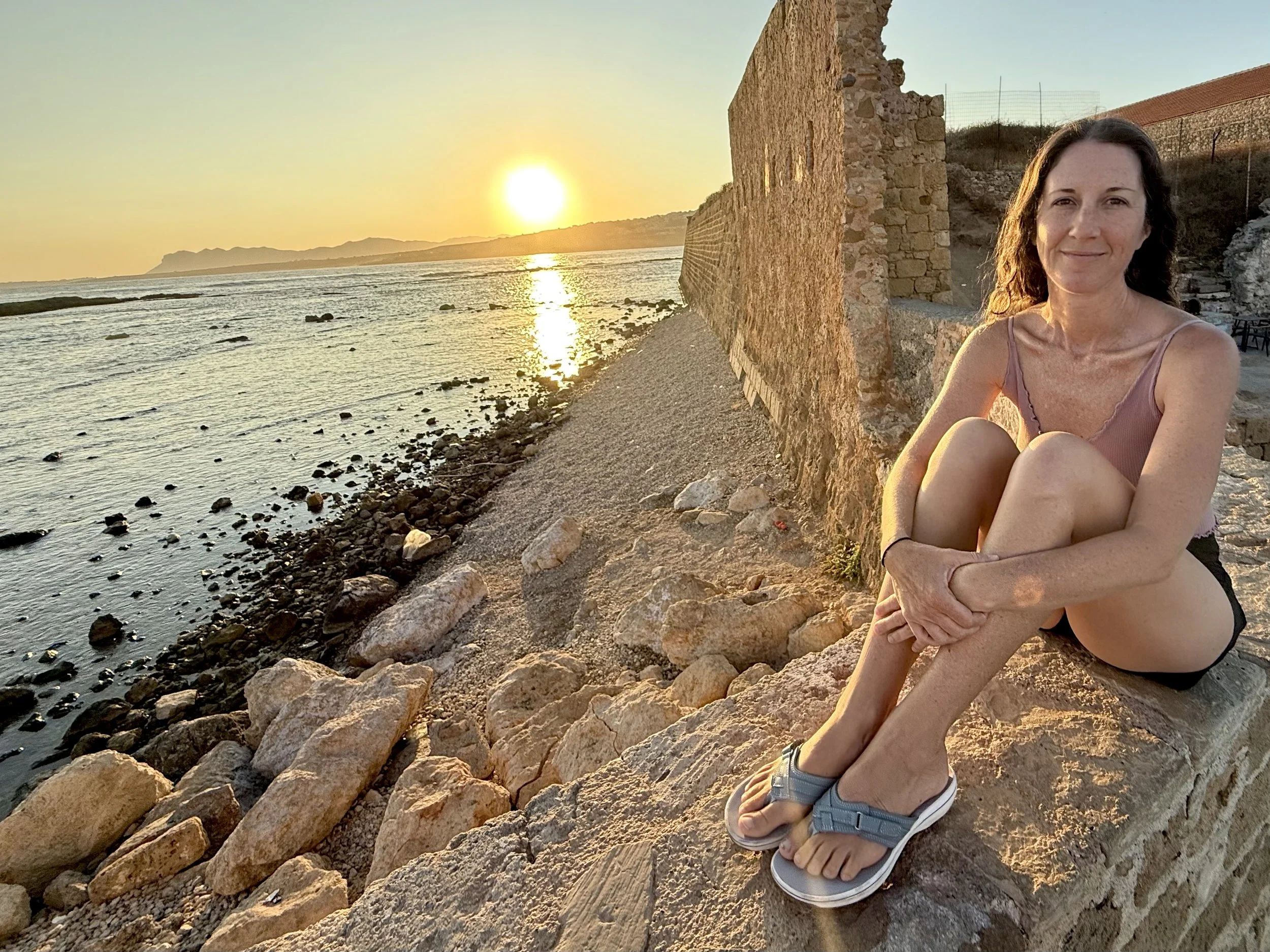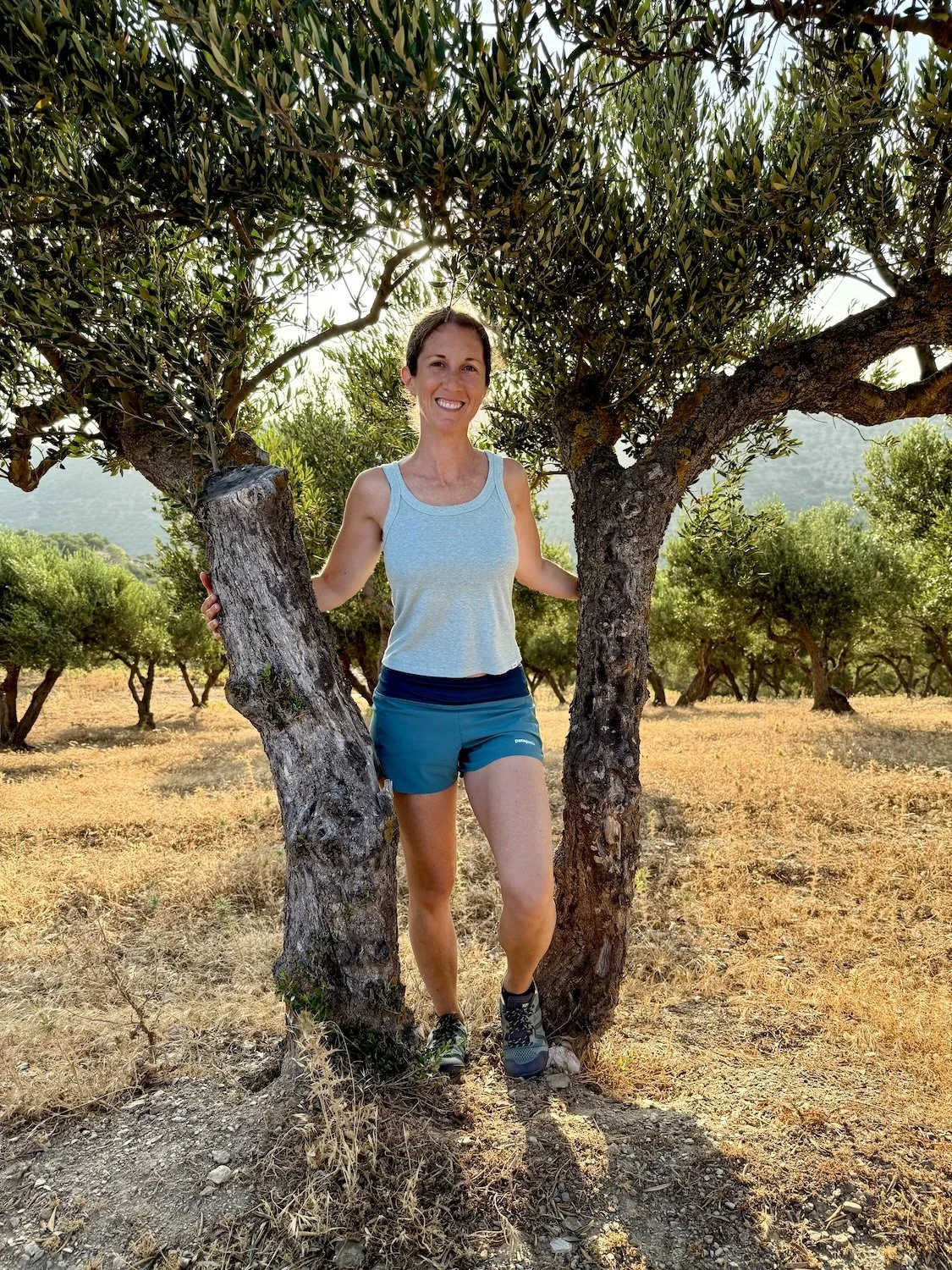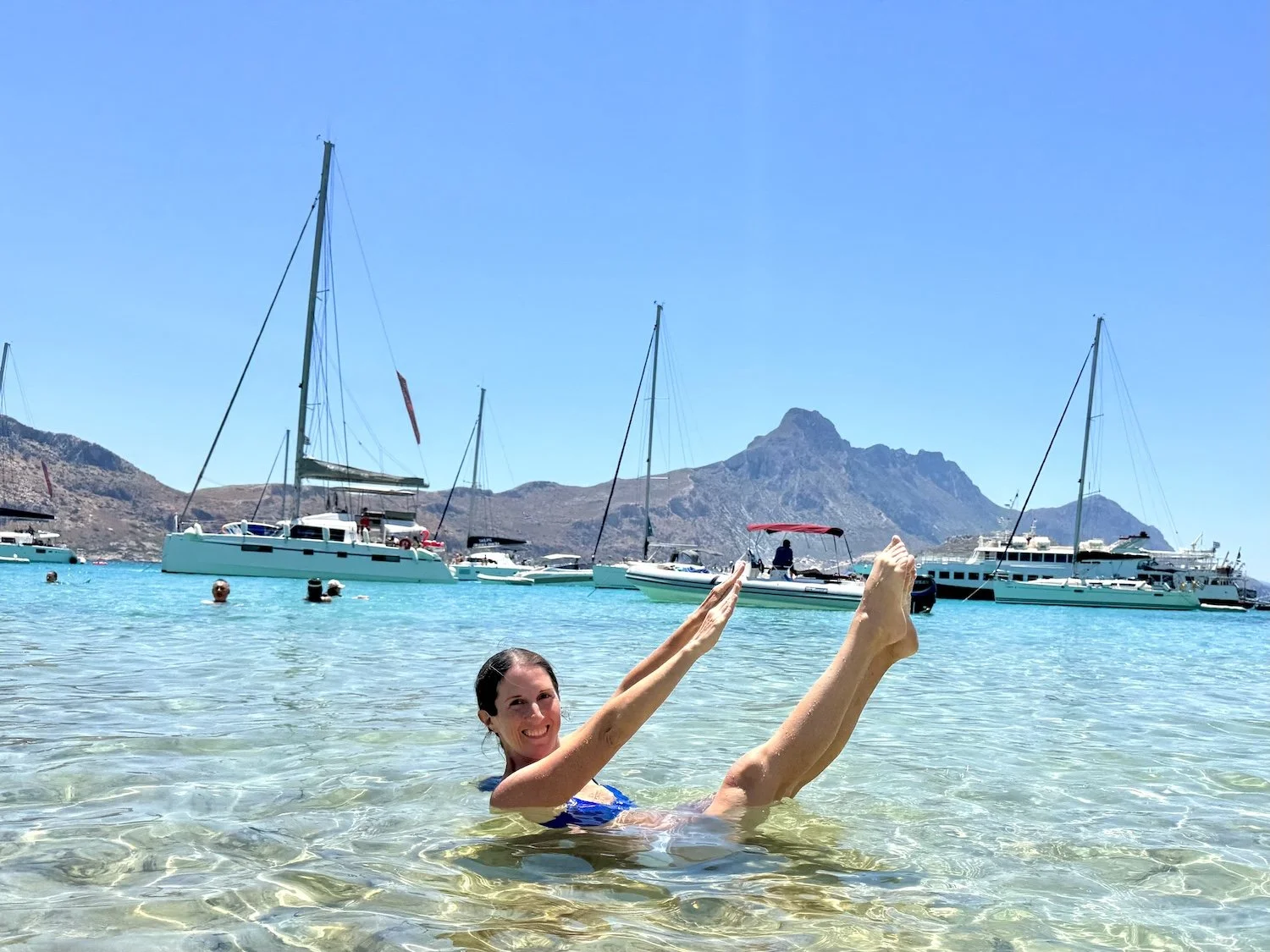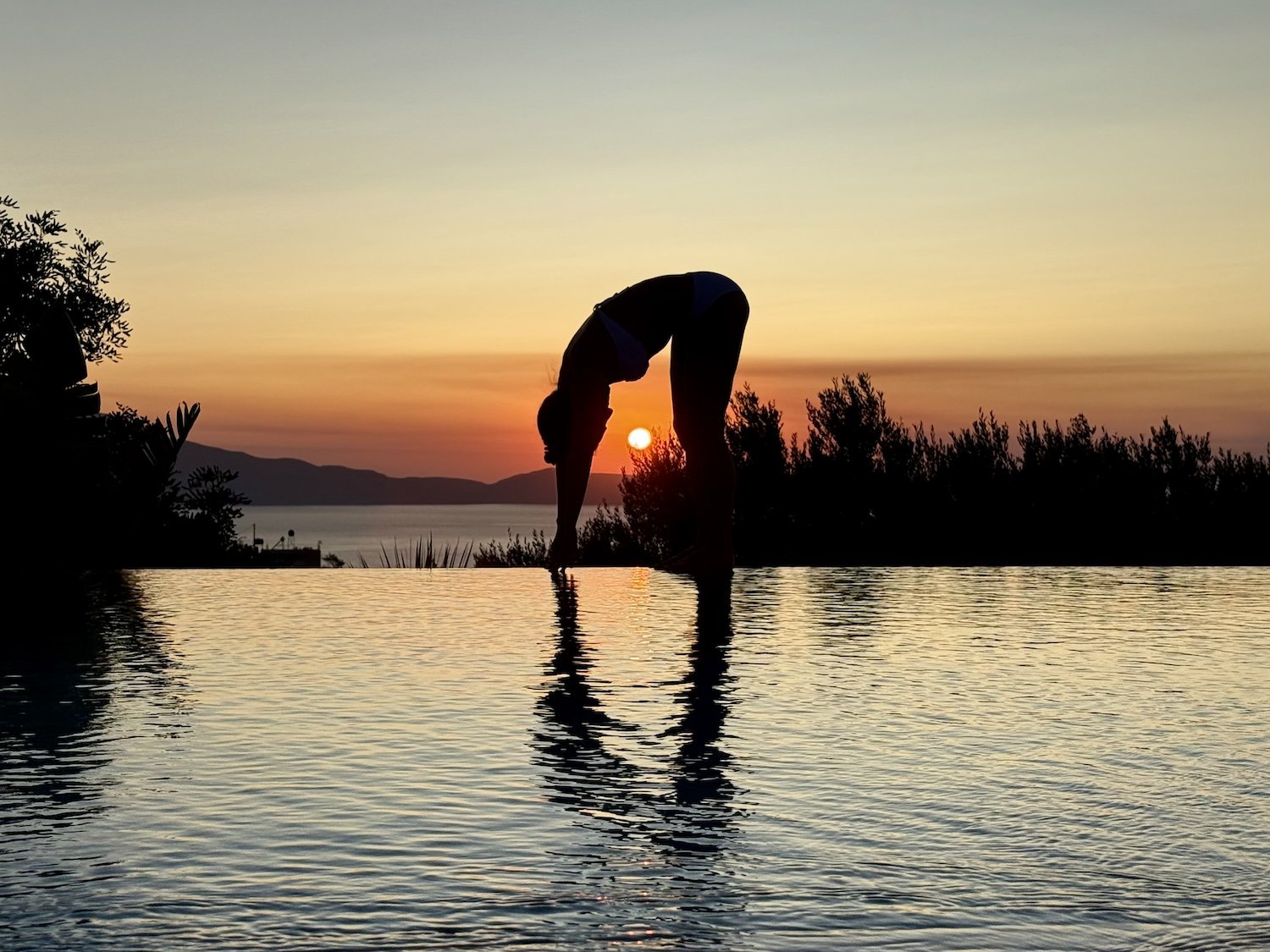A Circadian Friendly Lifestyle goes on Vacation
Sunrise walk in the waters of the Mediterranean. Walking barefoot in salt water is also excellent earthing, which reduces inflammation.
For over two years, I’ve been using light and food, and especially their timing, to enhance my circadian rhythms—otherwise known as a circadian friendly lifestyle. But I was about to take a 3+ week trip to Europe, which has a notably circadian mismatched culture, and was nervous about how it would go. For example, it’s not uncommon in Mediterranean countries like France, Italy and Greece to eat dinner very late, sometimes even after 10pm.
The best signal to set your circadian rhythms is light. So when you’re traveling to a new country and new latitude, you need to understand when sunrise, high sun, and sunset occur. The Circadian App is free and easily gives you this information. However, getting up for sunrise on vacation is a pretty hard sell. I aimed for it most mornings but also cut myself some slack as I recovered from jet lag or after a poor night’s sleep.
A beach all to ourselves at 6:00am. Normally, this beach in Rethymno, Crete is packed. Being a “night owl” for almost my entire life, this is one of the first times I’ve seen a sunrise over the water.
We got to explore this Venitian wall to the lighthouse all by ourselves in Chania, Crete. Another perk of being up this early is I just roll out of bed and go. No one else is awake to see that I haven’t washed my face or brushed my hair.
When I was up for sunrise, it was such a treat. Southern Mediterranean countries get very hot in the summer so early morning is a treasured time of lovely temperatures. And because hardly anyone is up early (many of our hotels didn’t start serving breakfast until 8:30am and sunrise was closer to 5:30am!), the mornings were shockingly peaceful. We were able to explore all the sites without hoards of tourists. Even if being up that early didn’t do anything for my physiology, I still would have considered it for those tourist benefits.
The sun rises over the goats in Western Crete.
One part of our trip involved staying in a villa in the middle of nowhere. We were surrounded by olive orchards, flocks of sheep, and goats. When you’re up early, you actually get to see the animals out and eating before the heat of the day. We even stumbled upon two male goats fighting one morning. It was such a treat to feel so connected to all of nature—the light cycle, the trees, and the local animals.
Sunrise in an olive orchard. Exploring at sunrise helps me easily reach my 10k+ steps goal every day.
An additional perk of being up at sunrise is I am typically walking at that time. Before I’ve even had breakfast, I often accumulate 4-6k steps, which easily helps me walk over 10k steps every day.
You want your days as bright as possible so spend as much time outside as you can—an easy task on vacation!
While being up around sunrise and getting lots of early morning sun into your eyes is one of the most important aspects of setting your circadian rhythms, another one is getting as much bright outdoor light into your eyes and on your skin as possible during the day. In my regular life, I spend most of my day indoors and have to work hard to get my goal of 3 hours outside each day. On vacation though, it’s easy to spend the whole day outside. In fact, almost all dining in Greece is done al fresco this time of year. Indoor lighting hardly ever reaches over 1000 lux (a measure of brightness). Outdoors on a sunny day though, it can easily be 20-100x that brightness. The strong bright day contrasted by a very dark night helps your body understand what time of day it is and when to run certain programs like digestion or when to release certain hormones like cortisol and melatonin.
Side Bend at sunset on the infinity pool.
The next step for using light to set circadian rhythms is to see the sunset and then afterwards, make it as dark as possible. We brought book lights and nightlights that lack blue light (which is the frequency that sets your circadian rhythms), so after seeing sunset, we went indoors and used our own red lights until we went to bed. The darker your night, the more melatonin you release. Melatonin doesn’t just help you sleep, it helps you repair and rejuvenate. So darkness after sunset is critical for optimal health. Now, we did go to the Netherlands and spend some time at 52-degrees latitude, which meant the sun set after 10pm and rose at 5:30am. This wasn’t enough darkness for us, so we pulled the blinds shut and darkened our hotel room before sunset to ensure sufficient and high quality sleep.
Watching the sunset around 8:45pm at the villa in Crete. Then into a dark room with blue-light free light sources to read before going to bed.
Breakfast. Trying to eat closer to when you wake in the morning helps your body understand it’s day.
After light, food is the next best signal for cuing your body to know what time of day it is. It is tricky to control food timing on vacation. However, I did my best to eat breakfast as early as I could (which was often after 8am because of what time breakfast was served or because of morning walks). In Greece, lunch is usually around 2pm with dinner after 8pm. But digestion works better earlier in the day, and sleep works better if it’s not done when you’re also trying to digest. So we decided to eat a really large breakfast, push our lunches back a little later (finishing around 4pm), and then skip dinner. This had one of the most remarkable results! Not only did we sleep better not trying to digest a huge dinner, but we also didn’t gain weight. We ate as much as we wanted and indulged in beverages and dessert as well, but narrowed our eating window to 8 hours or less. This meant no hangovers the next day and no weight gain. Pretty amazing for such a long trip where dessert and after meal beverages are compulsory (in Crete, they serve them and expect you to eat them even if you don’t order them).
Indonesian feast in Amsterdam.
Now skipping dinner isn’t always possible. In fact, when we visited the Netherlands, lunch was earlier and small so we didn’t want to skip dinner. But we did make reservations for as early as the restaurants allowed (often 5:30pm) and I reduced the quantity of food at dinner. However, vacation is vacation and when this Indonesian feast was served, I indulged and didn’t regret it. Once your circadian rhythms are well established, you have some resiliency in the system and can tolerate occasional disruptions.
I learned that it is possible to stick to some of the lifestyle changes I deem important and still vacation in places that tend to disrupt circadian rhythms. Yeah, I didn’t have a huge dinner watching sunset and I didn’t partake in any night life, but I also slept better, didn’t gain any weight, and got to explore and sightsee first thing in the morning without other tourists. With a little resolve and creativity, I could support my circadian rhythms and still experience satisfying travel.
Allow light to be at the center of your lifestyle, and you’ll reap the benefits that nature has offered for free to all life on earth since the beginning of time.
See this 47-second YouTube Short from my trip.












